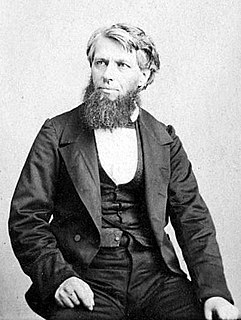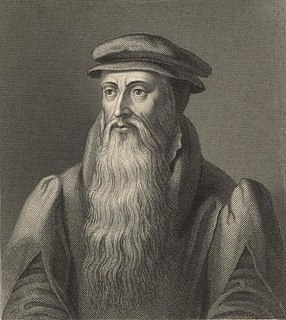A Quote by Plato
For the man who makes everything that leads to happiness, or near to it, to depend upon himself, and not upon other men, on whose good or evil actions his own doings are compelled to hinge,--such a one, I say, has adopted the very best plan for living happily. This is the man of moderation; this is the man of manly character and of wisdom.
Related Quotes
Weapons compound man's power to achieve; they amplify the capabilities of both the good man and the bad, and to exactly the same degree, having no will of their own. Thus we must regard them as servants, not masters - and good servants to good men. Without them, man is diminished, and his opportunities to fulfill his destiny are lessened. An unarmed man can only flee from evil, and evil is not overcome by fleeing from it.
I think you may judge of a man’s character by the persons whose affection he seeks. If you find a man seeking only the affection of those who are great, depend upon it he is ambitious and self-seeking; but when you observe that a man seeks the affection of those who can do nothing for him, but for whom he must do everything, you know that he is not seeking himself, but that pure benevolence sways his heart.
I believe that the unity of man as opposed to other living things derives from the fact that man is the conscious life of himself. Man is conscious of himself, of his future, which is
death, of his smallness, of his impotence; he is aware of others as others; man is in nature, subject to its laws even if he transcends it with his thought.
How much reverence has a noble man for his enemies!--and such reverence is a bridge to love.--For he desires his enemy for himself, as his mark of distinction; he can endure no other enemy than one in whom there is nothing to despise and very much to honor! In contrast to this, picture "the enemy" as the man of ressentiment conceives him--and here precisely is his deed, his creation: he has conceived "the evil enemy," "the Evil One," and this in fact is his basic concept, from which he then evolves, as an afterthought and pendant, a "good one"--himself!
God has created all things for good; all things for their greatest good; everything for its own good. What is the good of one is not the good of another; what makes one man happy would make another unhappy. God has determined, unless I interfere with His plan, that I should reach that which will be my greatest happiness. He looks on me individually, He calls me by my name, He knows what I can do, what I can best be, what is my greatest happiness, and He means to give it me.
The general consent of all that sect is that God (by his foreknowledge, counsel, and wisdom) has no assured election, neither yet any certain reprobation, but that every man may elect or reprobate himself by his own free will, which he has (say they) to do good or evil ... [All these things are] forged by their own brains, and polished by the finest of their wits, when yet in very deed they are but the rotten heresies of ... Pelagius, long ago confuted by Augustine.
The good devout man first makes inner preparation for the actions he has later to perform. His outward actions do not draw him into lust and vice; rather it is he who bends them into the shape of reason and right judgement. Who has a stiffer battle to fight than the man who is striving to conquer himself.
It is a proverbial expression that every man is the maker of his own fortune, and we usually regard it as implying that every man by his folly or wisdom prepares good or evil for himself. But we may view it in another light, namely, that we may so accommodate ourselves to the dispositions of Providence as to be happy in our lot, whatever may be its privations.
Down these mean streets a man must go who is not himself mean, who is neither tarnished nor afraid...He is the hero, he is everything. He must be a complete man and a common man and yet an unusual man. He must be, to use a rather weathered phrase, a man of honor, by instinct, by inevitability, without thought of it, and certainly without saying it. He must be the best man in his world and a good enough man for any world
That in all capital or criminal prosecutions a man bath a right to demand the cause and nature of his accusation, to be confronted with the accusers and witnesses, to call for evidence in his favor, and to a speedy trial by an impartial jury of twelve men of his vicinage, without whose unanimous consent he cannot be found guilty; nor can he be compelled to give evidence against himself; that no man be deprived of his liberty, except by the law of the land or the judgment of his peers.








































